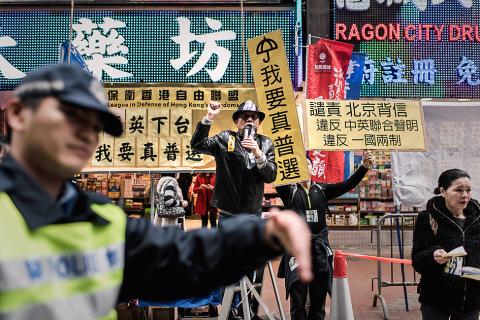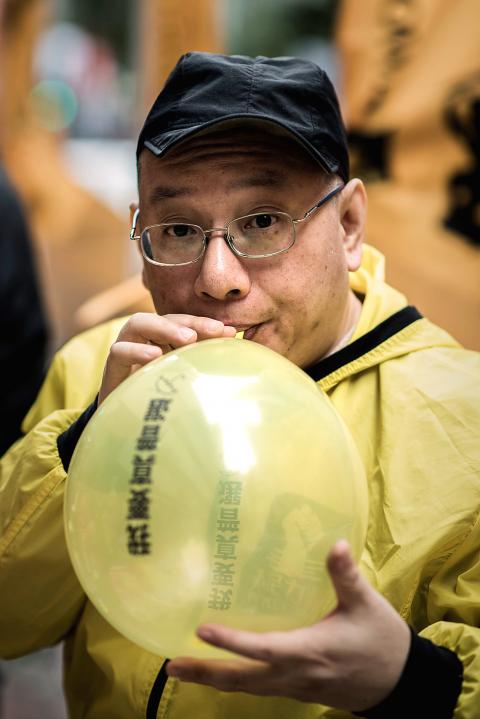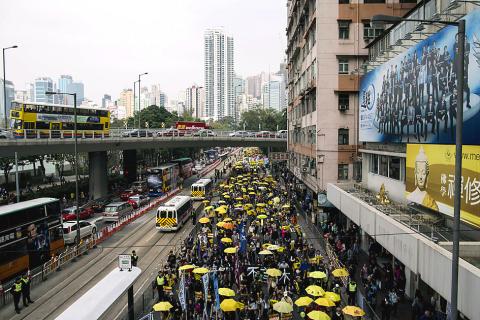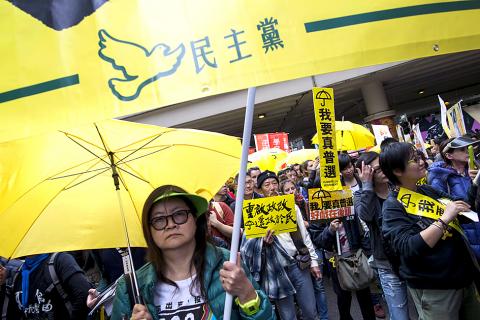Thousands of pro-democracy protesters took to the streets of Hong Kong yesterday for the first time since mass demonstrations shut down parts of the territory for more than two months during the Umbrella movement from Sept. 26 to Dec. 15 last year.
A sea of yellow umbrellas — the symbol of the campaign — moved slowly through central Hong Kong with crowds shouting for “true universal suffrage.”
However, numbers were well below expectations, with 13,000 attending, organizers said — just over one-quarter of the 50,000 they had hoped for.

Photo: AFP
“Today’s protest was not a small one. It was smaller than we expected, but it is wrong to say Hong Kongers have given in to fake democracy,” organizer Daisy Chan (陳倩瑩) said.
Police officials said up to 8,800 people had joined the march, a fraction of the tens of thousands who gathered at the peak of the protests last year.
Authorities have made no concessions to activists’ demands and tensions remain high in the semi-autonomous Chinese territory.

Photo: AFP
Police officials before the rally said that demonstrators were likely to once again try to occupy some of Hong Kong’s main roads, which were cleared of tented camps in December last year.
By late afternoon, the march remained peaceful, with no sign that the crowds — including many people carrying yellow balloons — planned to take back the streets.
“We do not have a plan [to reoccupy]. If others want to do it, they will have to do it themselves,” student leader Alex Chow (周永康) said.

Photo: Reuters
There was a sense of determination among demonstrators.
“We just want to express our frustration with the government in Hong Kong,” protester Ronnie Chan said. “We understand there is very little we can do, but if we do not speak out, nothing will change.”
The pro-democracy rallies drew about 100,000 at their height and saw intermittent clashes with police officers, but public support faded as the weeks passed.

Photo: Reuters
China has promised Hong Kongers the right — for the first time — to vote for their chief executive in the 2017 election.
However, Beijing ruled that nominees must be vetted by a pro-Beijing committee, a proposal heavily criticized by activists.
The movement’s founders, including academic Benny Tai (戴耀廷), along with teenage activist Joshua Wong (黃之鋒) and other student leaders, urged residents to keep fighting as they joined yesterday’s rally.
“If we do not dream, we do not have hope. We should persist, then we will succeed,” Tai said.
Wong warned against accepting universal suffrage within the restrictions of Beijing’s framework.
“I hope people understand that if we take that now, it will be [that way] forever,” he said.
Political analyst Sonny Lo (盧兆興) said that residents were exhausted from protests for reform.
“Members of the public are tired of politics. The democrats have to strategize very carefully,” Hong Kong Institute of Education head of social sciences Lo said.
Hong Kong’s government is urging the public to support Beijing’s electoral plan, which needs the backing of two-thirds of the territory’s legislature to be passed.
Executive Council convener Lam Woon-kwong (林煥光) told protesters to accept Beijing’s offer.
“You cannot threaten the central authorities,” he said on a radio program. “If we can have consensus to have universal suffrage in 2017 first and democratize further later, it would be a more pragmatic approach.”
For some protesters, backing down is not an option.
“I’m just doing my bit. Some people might have compromised, but I definitely will not,” a father of two named Alvin said.

A magnitude 7.0 earthquake struck off Yilan at 11:05pm yesterday, the Central Weather Administration (CWA) said. The epicenter was located at sea, about 32.3km east of Yilan County Hall, at a depth of 72.8km, CWA data showed There were no immediate reports of damage. The intensity of the quake, which gauges the actual effect of a seismic event, measured 4 in Yilan County area on Taiwan’s seven-tier intensity scale, the data showed. It measured 4 in other parts of eastern, northern and central Taiwan as well as Tainan, and 3 in Kaohsiung and Pingtung County, and 2 in Lienchiang and Penghu counties and 1

FOREIGN INTERFERENCE: Beijing would likely intensify public opinion warfare in next year’s local elections to prevent Lai from getting re-elected, the ‘Yomiuri Shimbun’ said Internal documents from a Chinese artificial intelligence (AI) company indicated that China has been using the technology to intervene in foreign elections, including propaganda targeting Taiwan’s local elections next year and presidential elections in 2028, a Japanese newspaper reported yesterday. The Institute of National Security of Vanderbilt University obtained nearly 400 pages of documents from GoLaxy, a company with ties to the Chinese government, and found evidence that it had apparently deployed sophisticated, AI-driven propaganda campaigns in Hong Kong and Taiwan to shape public opinion, the Yomiuri Shimbun reported. GoLaxy provides insights, situation analysis and public opinion-shaping technology by conducting network surveillance

‘POLITICAL GAME’: DPP lawmakers said the motion would not meet the legislative threshold needed, and accused the KMT and the TPP of trivializing the Constitution The Legislative Yuan yesterday approved a motion to initiate impeachment proceedings against President William Lai (賴清德), saying he had undermined Taiwan’s constitutional order and democracy. The motion was approved 61-50 by lawmakers from the main opposition Chinese Nationalist Party (KMT) and the smaller Taiwan People’s Party (TPP), who together hold a legislative majority. Under the motion, a roll call vote for impeachment would be held on May 19 next year, after various hearings are held and Lai is given the chance to defend himself. The move came after Lai on Monday last week did not promulgate an amendment passed by the legislature that

Taiwan is gearing up to celebrate the New Year at events across the country, headlined by the annual countdown and Taipei 101 fireworks display at midnight. Many of the events are to be livesteamed online. See below for lineups and links: Taipei Taipei’s New Year’s Party 2026 is to begin at 7pm and run until 1am, with the theme “Sailing to the Future.” South Korean girl group KARA is headlining the concert at Taipei City Hall Plaza, with additional performances by Amber An (安心亞), Nick Chou (周湯豪), hip-hop trio Nine One One (玖壹壹), Bii (畢書盡), girl group Genblue (幻藍小熊) and more. The festivities are to